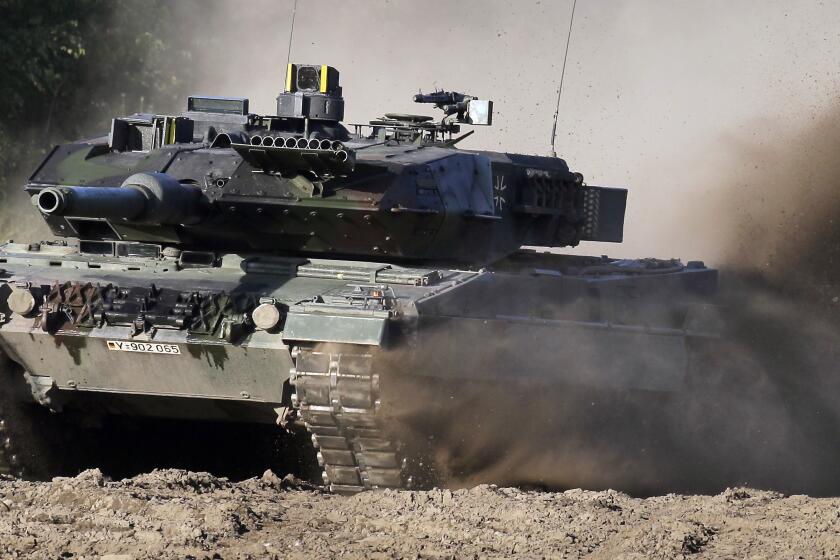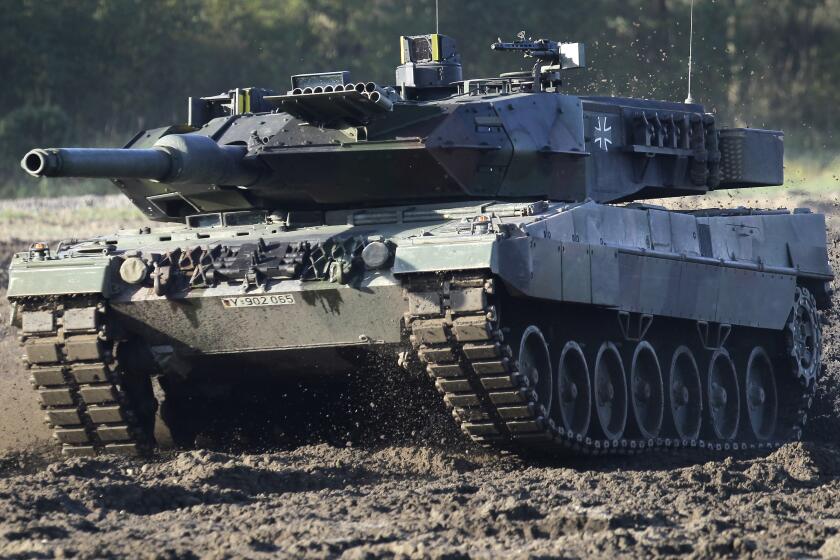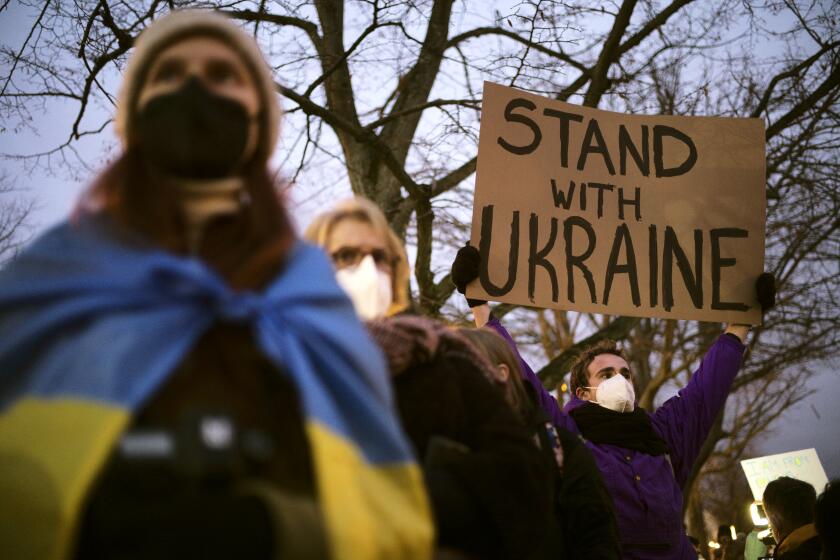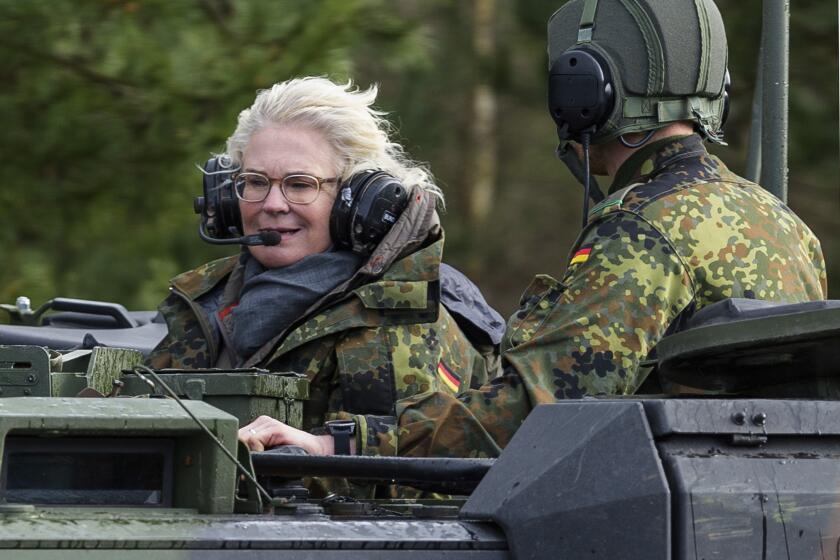‘War scares us stiff’: Germany’s reluctance to arm Ukraine is rooted in its bloodstained past
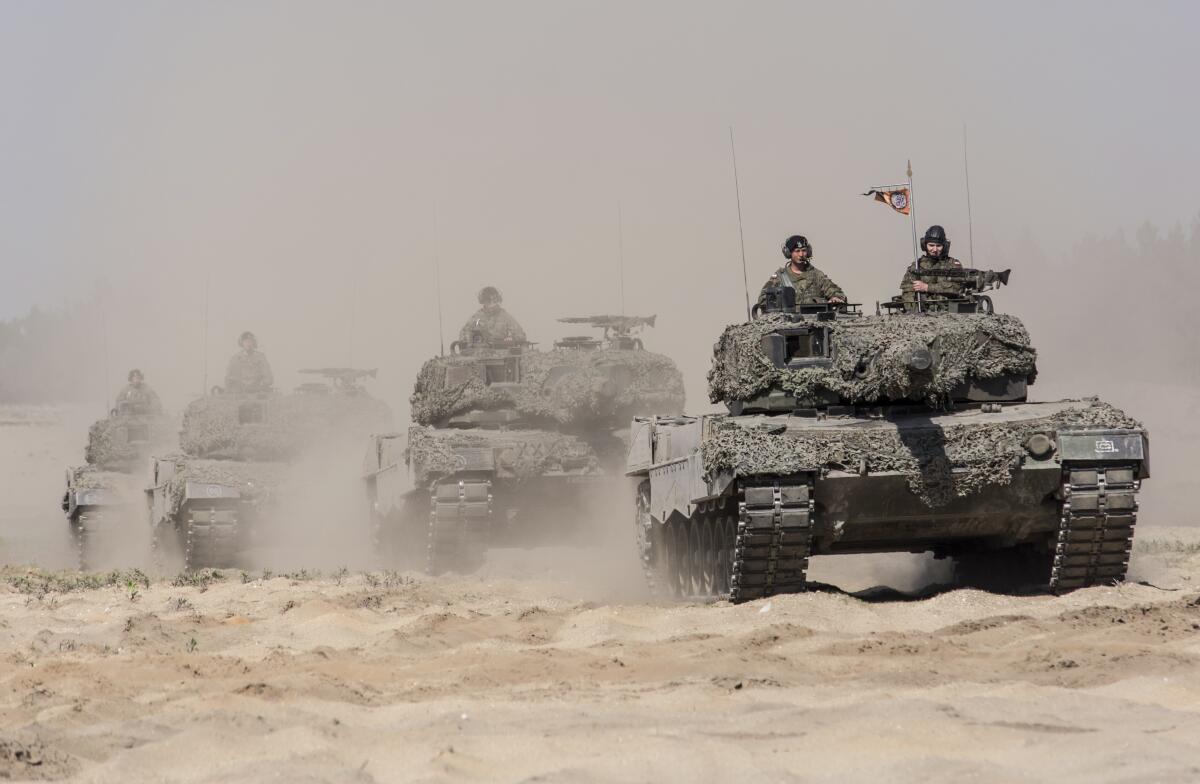
- Share via
BERLIN — They grew up on opposite sides of the Iron Curtain. In Communist East Germany, Sahra Wagenknecht learned as a child that Russia was an ally and the United States a threat to peace, while 250 miles away, Gerd Bauz lived near an American military base that he was told was there to protect West Germany from a feared Warsaw Pact invasion.
Despite those different upbringings, the pair agree on one thing: Germany today should be trying to stop the war in Ukraine, not helping to keep the fighting going by arming Kyiv with more sophisticated weapons, tanks and other materiel. It’s a view shared by millions of Germans vociferously opposed to war.
“Germany started two catastrophic world wars, and that’s why war scares us stiff,” said Wagenknecht, 53, a member of Parliament for the opposition Left party. “It makes me sick to think that German tanks could be used to attack Russians again.”
Bauz, 72, believes Russia’s invasion of Ukraine could be halted quickly if only the U.S. had the will to take the lead in peace talks.
“It’s completely absurd that there’s war in Europe in the 21st century,” said Bauz, whose parents’ families were decimated in World War II and who became a conscientious objector. “We need to be beyond warfare in Europe. It’s all wrong.”
That historical memory — of two global conflicts Germany instigated, first under their kaiser in 1914 and then under the Nazis in 1939, that led to widespread destruction and the deaths of tens of millions — helps explain why the country has been so reluctant to send arms to Ukraine to support its defense against Russia’s invasion. Although Berlin has so far gone along with other North Atlantic Treaty Organization countries and gradually become a major supplier of military hardware to Kyiv, including howitzers and antiaircraft systems, it has often been slow in doing so, to the exasperation of its allies.
Germany may soon approve deliveries of high-tech Leopard 2 tanks that Ukraine and others hope will boost Kyiv’s fight against Russian invaders.
The recent dust-up over whether to send combat tanks, which Chancellor Olaf Scholz finally agreed to this week only after the U.S. signaled its intention to do the same, offered the latest example of German hesitancy. But it won’t be the last, analysts say, warning that Berlin will continue to need persuading and pressuring even as the war spins on and as Russian President Vladimir Putin looks for divisions to exploit among Ukraine’s backers.
“It’s Germany’s signature on foreign policy since Feb. 24, 2022,” the day of Russia’s invasion, said Soenke Neitzel, an author and military historian at Potsdam University. “Act together with your alliance partners — but only in the middle or at the rear of the NATO convoy.”
Scholz announced Wednesday that Berlin would send 14 of its highly regarded Leopard 2 tanks to Ukraine, which is bracing for a renewed offensive by Russian forces after the winter. Just as important, Scholz also agreed to grant the export permission that other NATO countries, such as Poland and Spain, need before they can dip into their own stocks of the German-made 60-ton combat tanks and transfer them to Ukraine.
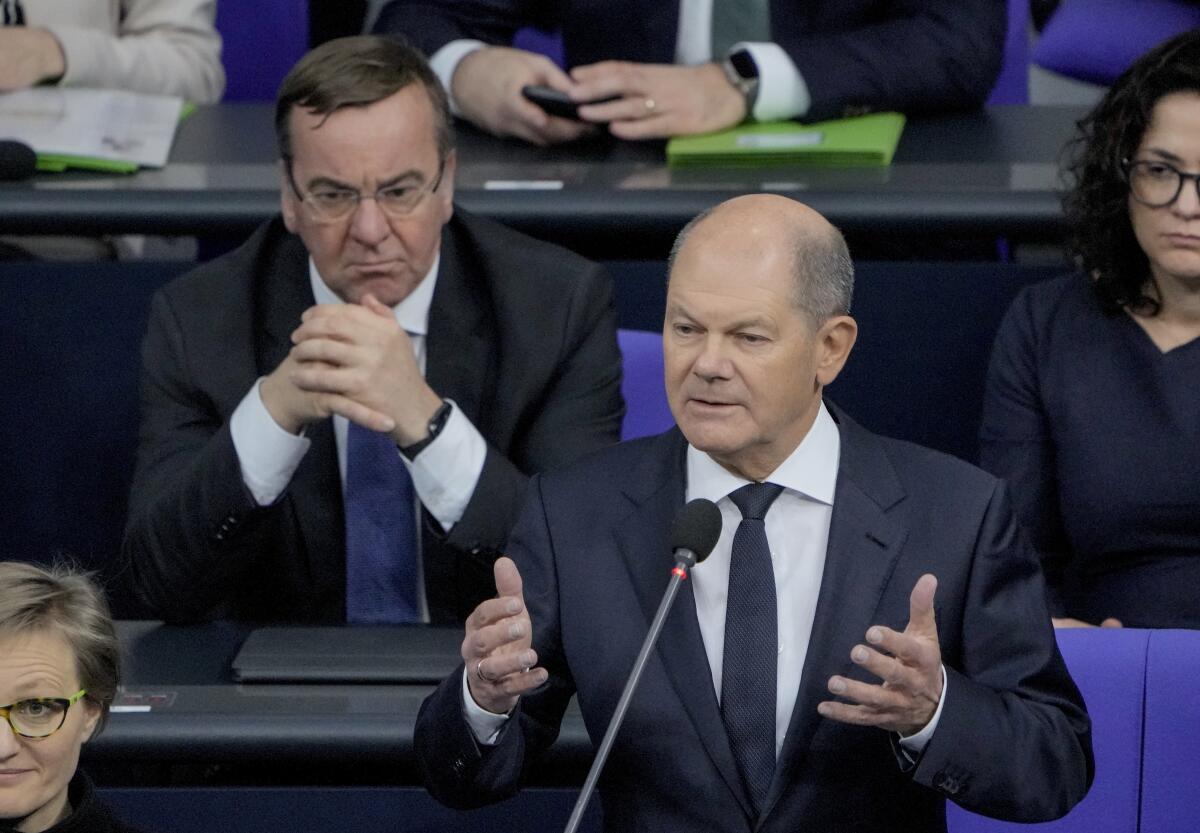
But Scholz acknowledged many Germans’ opposition to or unease with his decision. He pleaded for their confidence in a solemn speech to Parliament and tried to impress upon them the threat in their backyard.
“There really is a war in Europe, and it’s not far from Berlin,” he said. “A lot of people are fearful. I urge you to have trust in me. ... We’ll make sure that our support is possible without raising risks to our country.”
He assured them that Germany would never put boots on the ground in the current conflict: “We won’t send troops to Ukraine, and there won’t be any NATO involvement. You have my word on that.”
For its part, the Biden administration has agreed to furnish Kyiv with powerful U.S. M1 Abrams tanks, a move that gave Scholz the political cover to follow suit.
After Berlin signaled its likely consent, Poland said it would ask Germany for permission to send Leopard tanks to Ukraine, which badly wants them.
A recent poll showed Germans to be fairly evenly divided over whether to provide Ukraine with tanks, with 46% in favor and 43% opposed. A majority of those opposed are supporters of Scholz’s center-left Social Democratic Party, which has made things awkward for the chancellor.
Germany’s weapons deliveries to Ukraine have marked the end to one of its self-imposed postwar limits on arms: a ban on exporting military equipment to conflict zones.
The tectonic shift is part of what Scholz, in a landmark speech a few days after Russian troops barreled into Ukraine, called a Zeitenwende in Berlin’s military policy — a new era dawning. He pledged to set up a special fund worth about $109 billion to re-equip Germany’s armed forces, though none of it has so far been spent on weaponry. Germany’s military spending has long been below NATO’s target of 2% of gross domestic product and is currently just 1.3%.
Bolstering the war machine of another, non-NATO nation — Ukraine — is a step too far for many Germans, who are especially frightened by Putin‘s threats to use nuclear weapons.
Surging inflation and fears about an energy crisis from Russia’s ongoing war in Ukraine are taking a toll on the finances — and psyches — of Germans.
“A lot of people in Germany are duly worried that we’re going to get dragged into the war in Ukraine,” said Wagenknecht, one of Germany’s leading antiwar voices. “I think it’s irresponsible to follow a logic that there can only be military solutions. The Ukraine government doesn’t want to negotiate — its strategy is to draw NATO into the war. It’s understandable from their point of view, but I don’t see how German tanks will make a difference. It’s just going to increase the numbers killed.”
She scoffed at the idea that Ukraine can defeat Russia, echoing a sentiment that is more prevalent in the eastern part of Germany, which once had 500,000 Soviet soldiers stationed on its soil during the Cold War.
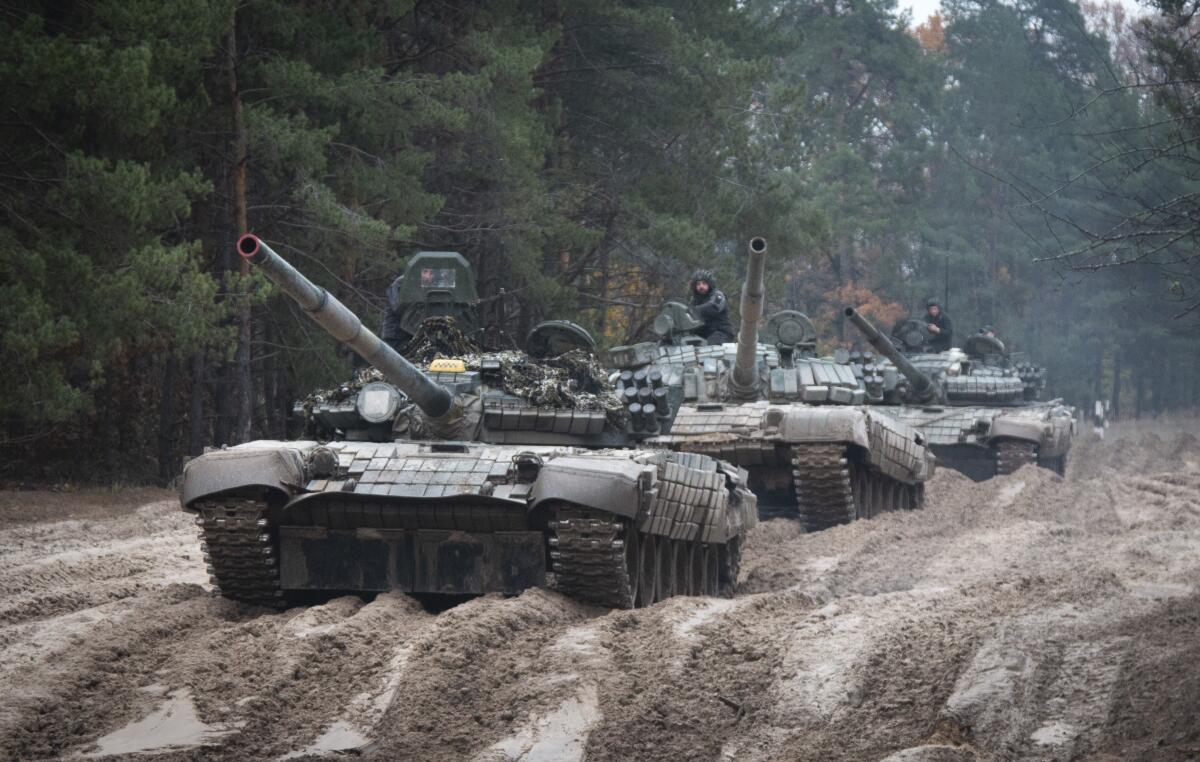
“Russia is a nuclear power, and sending more weapons will contribute to a dangerous escalation of the war, with the outcome uncertain,” Wagenknecht said. “That’s why I’m so scared, and so many others in Germany are too. If Germany sends combat tanks to Ukraine, Germany could become a target. We’re a lot closer to Ukraine than the United States.”
Just a few days after the war started, German Finance Minister Christian Lindner reportedly told the then-ambassador from Ukraine, Andriy Melnyk, that there was no point in Germany helping his country because it would be only a few hours before Russia vanquished it. Melnyk, who is now deputy foreign minister, later said he had tears in his eyes after being told that Ukraine had no chance.
For Germans such as Dagmar Grass, a physiotherapist who grew up in the East and lives in Cologne, opposition to the war and arms shipments from Germany remains deep.
Many migrants from the former Soviet Union living in Germany support Vladimir Putin.
Scenes at the hospital where she works have hardened her hatred of war, but she also realizes there are no easy solutions to the Ukraine conflict. She hopes peace talks can become part of the conversation soon.
“I’m proud to say I’m a pacifist,” Grass, 55, said. “And I’m glad our government has been so cautious.
“But I’ve been at work in my hospital and saw a Russian woman in one room crying for her son who was killed fighting, and in another room, there was a Ukrainian woman crying because her husband had been badly injured in combat and might not survive. I just wish the people who could stop this war would do everything possible to put an end to the fighting.”
That seems a distant prospect with the Kremlin insisting that it will not stop until the goals of its “special military operation” are achieved and with Ukraine demanding a withdrawal of Russian troops from every inch of its territory, including Crimea, which Moscow illegally annexed in 2014.
Breaking News
Get breaking news, investigations, analysis and more signature journalism from the Los Angeles Times in your inbox.
You may occasionally receive promotional content from the Los Angeles Times.
The war has also apparently changed a few minds inside the Bundeswehr, Germany’s military. The armed forces have long been held in relatively low regard or ignored by the public, shrinking in size from nearly 600,000 personnel at the end of the Cold War in 1990, which included conscripts, to a volunteer army of 183,000 now.
The Defense Ministry said recently that the number of conscientious objectors in the armed forces has risen fivefold since the start of the bloodshed in Ukraine, from 201 in 2021 to 951 in 2022.
For the record:
10:12 a.m. Jan. 26, 2023A previous version of this article gave sociologist Harald Welzer’s first name as Martin.
Harald Welzer, a leading sociologist and author, said Germans are more attuned to the horrors of war because they have so intensely studied the two world wars in school, talked about them with their families, and consumed books, films and media reports about them.
The recent movie adaptation of “All Quiet on the Western Front,” for example, depicts the gruesome realities of life in the trenches during World War I. The film, based on the classic 1929 antiwar novel by German war veteran Erich Maria Remarque, has received nine Oscar nominations.
Defense Minister Christine Lambrecht’s resignation follows persistent criticism of Germany’s military modernization and arms shipments to Ukraine.
“Germany is to blame for two world wars, and that disastrous history is deeply embedded in our soul,” said Welzer, who joined scores of other intellectuals in an open letter to Scholz last year pleading with him not to send arms to Ukraine. “We are past war as an option. We are post-military. We are past wartime heroics. We are beyond national patriotism that leads to war. That’s been totally disgraced by our history.”
Scholz has been steadfast in publicly avowing Berlin’s support for Kyiv and condemning Moscow’s invasion. Although his own party contains a powerful antiwar flank and many strongly opposed to German involvement, he governs in coalition with two smaller parties, the Greens and the Free Democrats, whose leaders have been vocal in their support for arming Ukraine.
Still, the chancellor’s more cautious pace reflects the broader split in opinion among his compatriots over Germany’s role. And despite his rhetoric of a sea change in German military policy early last year, his moves since have also largely stuck to the path that the country has followed for decades.
“After World War II, Germans had two reference points for their security: Never again war as a perpetrator, and never alone, only acting in an alliance,” said military historian Neitzel. “When Germans talk about war, they talk about atrocities, the evil sides of war, and a lot of people think there is no such thing as a ‘good war.’”
More to Read
Sign up for Essential California
The most important California stories and recommendations in your inbox every morning.
You may occasionally receive promotional content from the Los Angeles Times.
